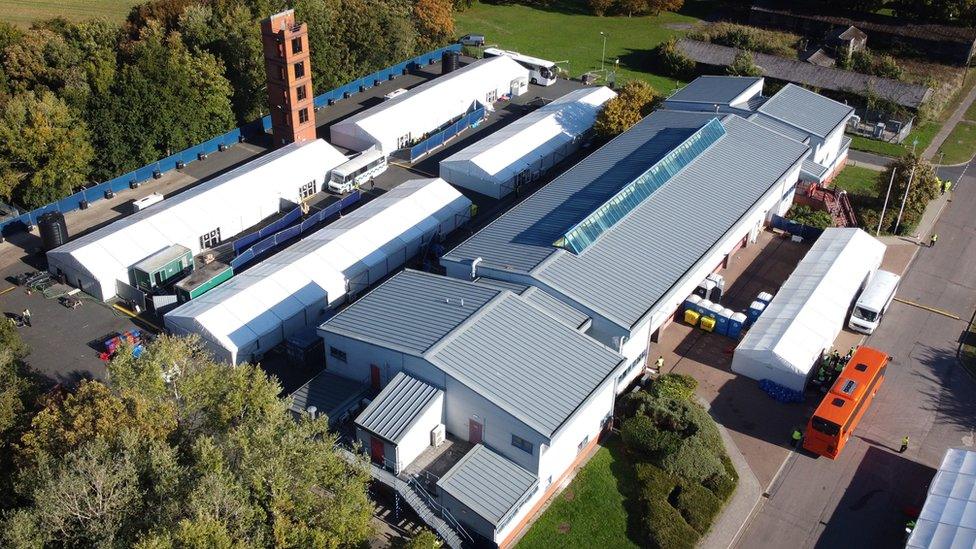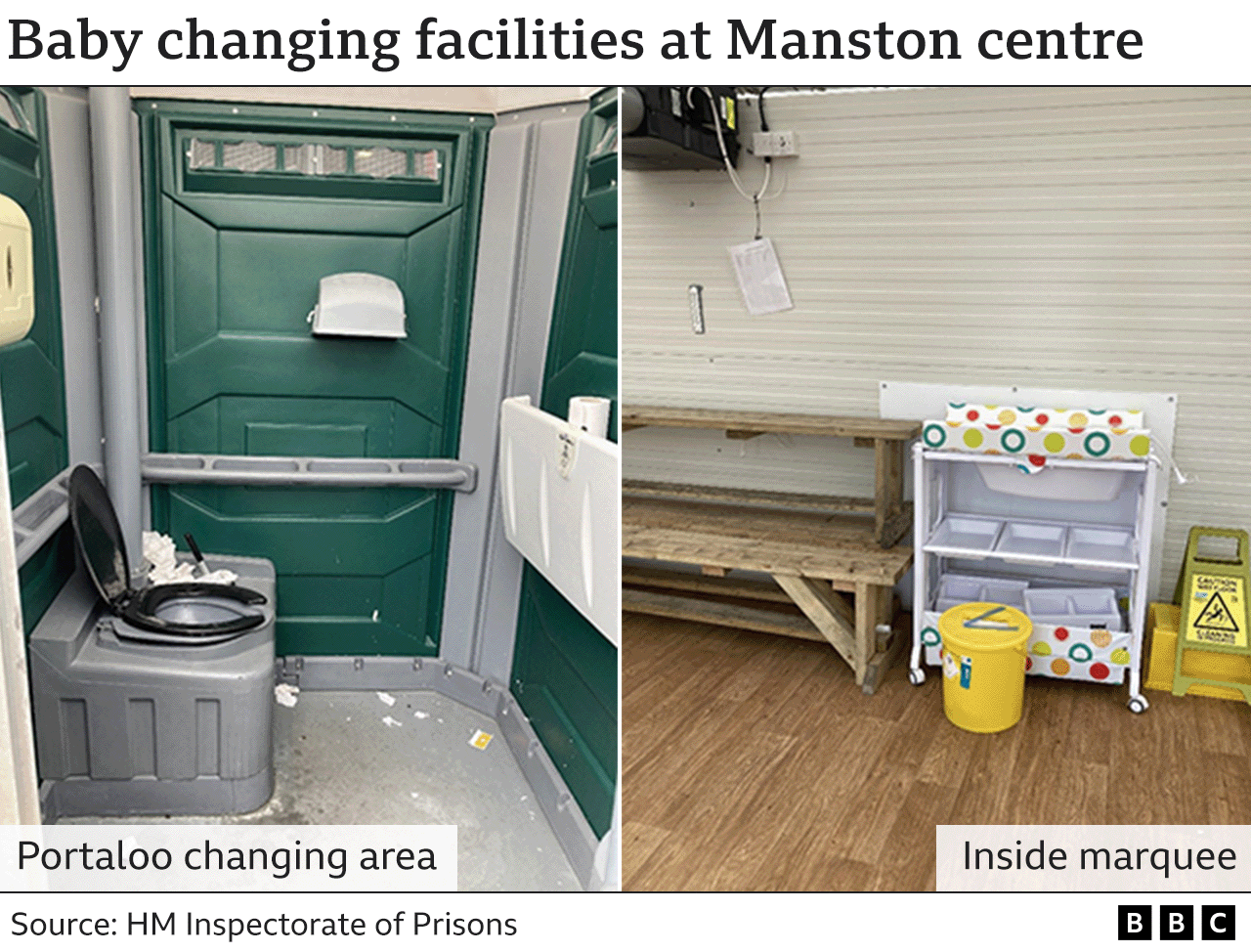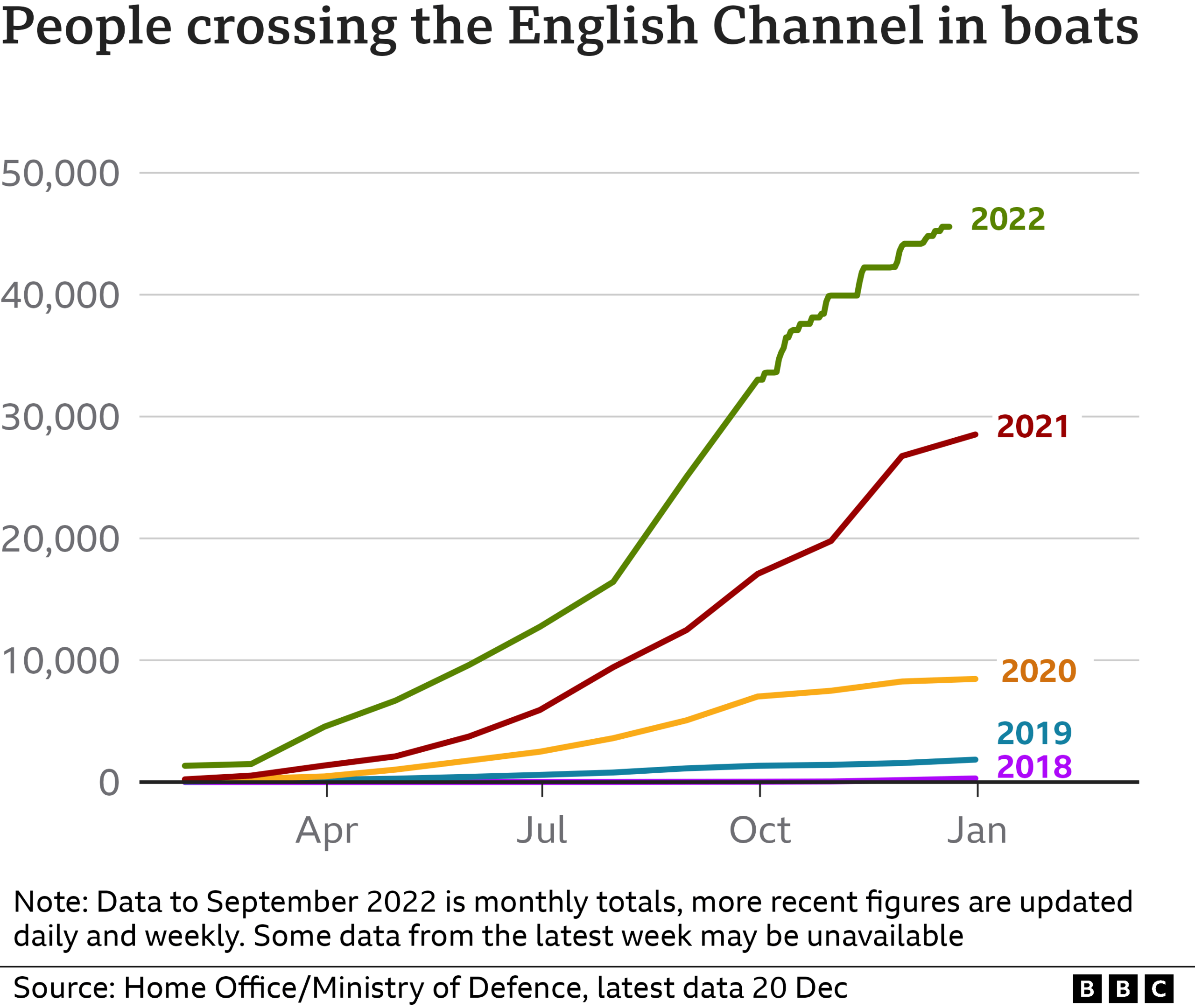Manston migrant centre: What were the problems?
- Published

Manston Airport detention centre in Kent
The Home Office said in late-November that there were no people being accommodated at the Manston migrant processing centre, which is a holding site for people who arrive in the UK in small boats.
During the autumn, thousands of people had been placed in tents there, leading to overcrowding and disease.
Home Secretary Suella Braverman has been criticised for the running of the site, which local Conservative MP Roger Gale said had been "overwhelmed".
What is Manston migrant centre?
Manston, a former military base in Kent, opened as a processing centre in February 2022, for the growing number of migrants arriving in the UK in small boats.
Migrants were meant to be held there for short periods while undergoing security and identity checks.
They were then supposed to be moved into the Home Office's asylum accommodation system, which often means a hotel.
Some go to immigration detention centres if the government believes it has a case to remove them.
On 26 October, the Home Office said, external: "The aim was to run a site that had between 1,000 and 1,600 people passing through it every day, and that all of those checks would be completed in under 24 hours. For a large part of this year, that is exactly how it was operating".
What were the problems at Manston?
On 31 October, there were around 4,000 migrants at Manston, according to Mr Gale.
Some migrants had been held for longer periods because of an apparent lack of alternative accommodation.
An official inspection of the centre, external in July found that "the length of detention was far too long, often more than 24 hours and sometimes far in excess of this".
By early November, between 450 and 500 asylum seekers had been moved to immigration removal centres as "Manston 'overflow'", according to Home Office emails seen by BBC News.

Picture of some of the Manston facilities from inspection in July 2022 by HM Prisons Inspectorate
Independent Chief Inspector of Borders and Immigration David Neal, who visited the camp on 24 October, said there were 2,800 migrants there on that day.
He told MPs: "I spoke to an Afghan family who had been in a marquee for 32 days."
He reported that migrants were being guarded by untrained custody officers and said: "What is really concerning and alarming is that the numbers, as described, are clearly outstripping the capacity of the site."
Lucy Moreton, head of the Immigration Services Union, which represented some staff at Manston, told Today on BBC Radio 4 on 27 October: "Staff face on a daily basis sit-down protests, being shouted at... improvised weapons are always being found... no prison in the UK has over 4,000 people uncontained, face-to-face with those who are responsible for controlling them."
A Home Office spokesperson responded: "Manston remains resourced and equipped to process migrants securely and we will provide alternative accommodation as soon as possible."
There were also a number of cases of diphtheria at the centre. The death of one migrant, who died in hospital on 19 November after being held at Manston, might have been caused by diphtheria, according to the Home Office. There have been more than 50 cases of the disease among asylum seekers who have recently arrived in the UK, the BBC understands.
On 22 November the Home Office said everyone staying at Manston had been placed in alternative accommodation.
What was the role of Suella Braverman?
The Times reported on 30 October, external that Ms Braverman had been told at least three weeks before that migrants, including families, were being held at Manston for four weeks, putting the government in breach of the law.
The BBC has been told that she was warned that the government was breaching statutory duties by failing to sign off on ways to move people to hotels or alternative accommodation immediately.
One source familiar with the situation told BBC News there was "crystal clear" advice that the government was not acting within the law.
Immigration Minister Robert Jenrick told Today on BBC Radio 4 that "the law is very clear that we shouldn't hold people for more than 24 hours".
Ms Braverman told MPs on 31 October: "On no occasion did I block hotels or veto advice to procure extra and emergency accommodation."
She said that since 6 September 2022, deals with 30 hotels had been agreed and 9,000 migrants had left Manston, with many heading to hotel accommodation.
Why was there a backlog?
At the end of June 2022 there were 100,000 asylum claims, external waiting for an initial decision from the Home Office.
One reason for the increased backlog - which is two-and-a-half times greater than at the end of 2019 - is the rise in number of asylum applications.
In 2021, there were 48,450 applications, compared with 63,089 so far in 2022. Large increases in small boat crossings have driven this trend.

A Home Affairs Committee report, external published over the summer said that "antiquated IT systems, high staff turnover, and too few staff are among the reasons for this slow pace".
The asylum backlog has left thousands of asylum seekers waiting in short term accommodation - such as hotels - which is costing the government around £5.6m per day.
The pressure in the asylum system worsened during the pandemic as people were prevented from being moved on to long-term accommodation because of the lockdown.
The Home Affairs Committee reported that 13,000 asylum seekers were living in hotels in September 2021.
What about other migrant centres?
The government uses another site in Kent - Western Jet Foil - as a processing centre where initial checks take place.
Earlier this year, a processing centre was due to open in the Yorkshire village of Linton-on-Ouse. The proposal was scrapped after opposition from the local Conservative council.
There are currently seven immigration removal centres located across England, Scotland and Northern Ireland, which hold people who are about to be removed from the UK.
However, some migrants have been sent to them upon arrival when there is no space at processing centres.
Other types of detention centres - such as short-term holding centres - are based in Manchester and Northern Ireland.